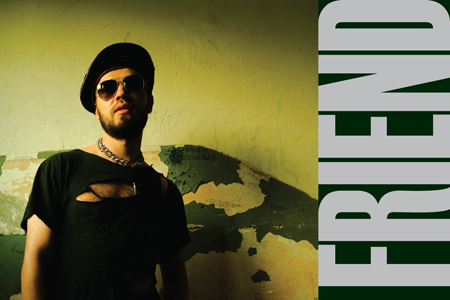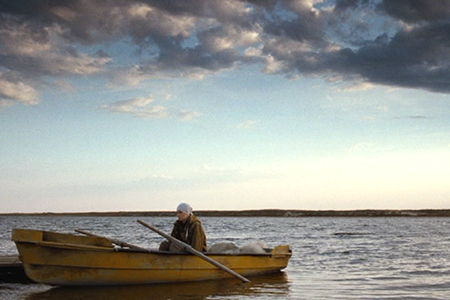March 24, 2013 |
Dmytro Moyseyev on His Debut and Current Ukrainian Cinema
(an interview with Ali Kinsella)
|
| |
Dmytro Moyseyev is a young Ukrainian filmmaker, who has just completed his first full-length feature film. He graduated from the Ivan Karpenko-Kary University for Theater, Film, and Television with the specialization in feature film directing.
As a student he had previously made four short films, all of which screened at festivals. They include Hello, World! (Zdorov-buv, svite!), 2005, One (Odna), 2007 (as script-writer), The Newcomer (Prybulets), 2008, and I Have a Friend (U mene ye druh), 2009.
Moyseyev is one of a limited number of directors actively working to return Ukrainian to the silver screen. He also has the singular distinction of being trained as a mathematician. Moyseyev lives and works in Kyiv. The interview was conducted in Ukrainian.
Ali Kinsella: What in your childhood made you want to become a director?
Dmytro Moyseyev: It wasn't quite like that. Somewhere around 12 or 13 I decided that I wanted to only study math, and for four years I did only that. But later when it was almost time to apply for college, for some reason I got this idea that I wasn't supposed to be a mathematician, but a film director. My first screenplay just came to life in my head. Since I didn't know anything except for mathematics, I decided to study math anyway. I enrolled in the mechanical mathematics department at the Taras Shevchenko National University of Kyiv, that is, a very serious department at a very serious university, so it wasn't easy. When I was in college, though I didn't do much math; I studied theater, painting, music, and cinema. After I graduated I entered the National University of Theater, Film, and TV in Kyiv right away and worked only at cinema. Later when I had gotten to know the profession better, it became apparent that self-expression isn't so simple. But I kept at it and now I've almost finished my first full-length feature film; I'll be done in two months. I really wanted to make it and somehow it has worked out that I almost have.
 |
| Moyseyev in lead part in I Have a Friend |
AK: Can you say a little about this film?
DM: Of course I can. About the screenplay, the production, or both?
AK: About the screenplay.
DM: The story takes place in Ukraine, possibly in our time but possibly 15 years ago. The people live by the sea. They have run away from civilization and live simply in two small houses near the sea. They catch fish, dry it, and sell it, and just live like that. There are no cell phones, no Internet in the movie, nothing very modern. There is a family of three: a husband, a wife, and a 7- or 8-year-old son and their neighbor, a single woman of 38. Everything would be very nice if she just weren't alone. That's about it for the setting. Well, she meets one person and then another and gets wrapped up with this individual. I can go into more details if you need, but if…
AK: No, let it be sort of mysterious.
DM: Yes! It should be a bit of a secret. The film is called Such Beautiful People [Taki krasyvi liudy] and it's not just about the love story of this woman, but more so about their way of life. The central theme of the film is tied not only to this single woman and the man she meets, but also very much to the family who lives nearby. The story and the philosophy of the film are a little different: the story is the story and the philosophy is the philosophy. They go alongside each other but they aren't the same.
AK: Are there some personal themes in this film? I know that you were born in Kherson [by the sea] and it seems to me that you shy away from social networks [and technology].
DM: No. I don't shy away, but I'd say I don't often go on. I am on Facebook—that's for work mostly so that I can communicate with my colleagues abroad. It's just that I prefer doing things to talking.
AK: Understood. What kind of language environment did you grow up in?
DM: In a Russian-speaking one. I learned Ukrainian only after I turned twenty-something, three or five.
AK: That late? Where, in Kyiv?
DM: In Kyiv, but only gradually. First, I became friends with people who were real native speakers and then I started reading books in Ukrainian. I mean literature because I, of course, read technical works in Ukrainian when I was a student, but I started reading literature in Ukrainian around the age of twenty-two. I read a lot of books. My Ukrainian is not exactly natural; it's more literary. I think that this will be somewhat noticeable in the film, as well. I purposefully strayed from the way people really speak because each region of Ukraine has its dialect and I didn't want the characters to talk like they do in the regions the actors are from. That would be a very broken language, not Ukrainian. So, keeping in mind that the philosophy of the film—the story of these people—was very important to me, I smoothed over the language a little bit. I made it more literary and avoided expletives and foreign borrowings.
AK: But why do you make your films in Ukrainian at all?
DM: More than anything, my professors influenced me. They told me, "Listen. You live in Ukraine. You have a Ukrainian character and mentality. You were born in Kherson and grew up speaking Russian, but you can speak Ukrainian, you can. Why don't you make your Ukrainian films in Ukrainian?" And I thought, "Why shouldn't my Ukrainian films be in Ukrainian?" If I were making a Russian film, it would be in Russian. An American film, it would be in American English.
AK: Which Ukrainian authors did you read then or do you read now?
DM: I read almost no Ukrainians. I meant that I was reading translations. I read Joyce in Ukrainian and Kōbō Abe, Murakami, Kawabata. I really love Japanese literature and I read many of my favorite authors in Ukrainian translation.
 |
| Discovering southern Ukraine in Such Beautiful People |
AK: But you don't read Ukrainians?
DM: I used to read classical Ukrainian literature, including works from the first half of the twentieth century. But I don't read modern stuff and I don't have any favorite Ukrainian authors either. It happens.
AK: What inspires you the most?
DM: Music. Music and life. These are the two things that are always with me. Of course I love to watch good movies.
AK: I read your screenplay No More Surprises Here.
DM: NO WAY! Where did you find it?
AK: Somewhere on the Internet.
DM: That's a very interesting screenplay because I really wanted to shoot that film. I had the equipment and I had a film crew but twenty-five professional actors turned me down. Not a single person wanted to act in that film.
AK: Why?
DM: Because it's very tragic and in some way a brutal story. People don't see the sense in playacting something like that when they're also surrounded by it. But I believe that it would make a rather good film and I didn't just write it. There are many stories like this, but this one was made up, drawn from my imagination. I wrote it because I was feeling the same thing as the main character. It seems to me that many people here in Ukraine feel that way and I believed this could be a movie. But people didn't agree. Later some people who read the screenplay said, "Oh we'd really like to do this." But they didn't really fit. They would have done it, but it requires characters whose faces show that they've lived through this. Maybe I'll shoot it someday.
AK: In your opinion, what does Ukrainian culture need? That is, high culture?
It's good that you said "high culture." The culture needs quite a lot, but in general you could say that our culture is lacking high culture. [Laughs.] Yes, the culture seriously needs high culture. What does it lack? Well I'll put it like this. I have a lot of artist-friends, artists who draw, paint, and sculpt. Among them are people who are really doing something that can be appreciated today, tomorrow, the day after. Something that is honest, something warm, that's interesting to look at. But in general what I see at exhibitions, especially of modern art, is only conceptual. Here in Ukraine there are very few people who do interesting things.
And what about the cinema? Well it's certain that our cinema is just now starting to create the first Ukrainian films. The state is beginning to finance it and some films have already started to come out. The good thing is that they're coming out. On the other hand, they're unfortunately not all very good. Why? Because, first of all, the screenplays aren't quite right. A person wants to say something so she thinks and thinks of what to say instead of just saying what she really believes. We have tons of screenplays in which something happens to the main character, but very few in which the main character says what's happening in his soul or what he desires. There are expressions like "I want," or "I'd like," or "I'm bothered by" in our cinema today. There is no immersion into the character, and this applies to painting as well as film. As for literature, I'm not sure. I've read interesting things. I read some interesting authors, but I can't say that I liked them more than the foreigners I love. I'll give you an example from music. I've found a young, Ukrainian composer who is living in The Hague. He's 28 and his name is Maksym Shalyhin. He's a very good composer, yet he doesn't live here but in The Hague. The same could be said about a lot of people. We've already recorded all the music for the film. We have it and it's cool. There might be flaws in the movie, but not in the music.
Interview conducted between New York City and Kyiv, Ukraine by Skype on March 24, 2013.
Translated from the Ukrainian by Ali Kinsella.
|
